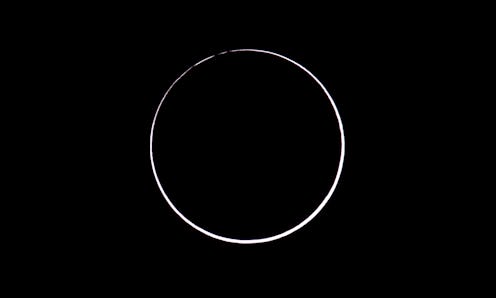Life
The Total Eclipse On Monday Might Not Be "Total" For You, Even If You're In The U.S.

If you've never seen a solar eclipse before, it's probably pretty hard to imagine what it might look like. Theoretically, you can understand that the sun's light is going to be blocked and so it'll be dark — but it's hard to conceptualize what that looks like, how dark it will actually get during the peak of the eclipse. All you have to compare it to is the sight of a bright moon against the dark sky, and while that might be similar, it's definitely not the same.
The most important factor in understanding what a solar eclipse looks like is determining where you're looking from. If you're observing from the path of totality, which runs through Oregon, Idaho, Montana, Wyoming, Nebraska, Kansas Iowa, Missouri, Illinois, Kentucky, Tennessee, Georgia, North Carolina and South Carolina, you're going to experience the darkest type of eclipse. For you, the sky will become gradually darker as the moon's shadow moves across the sun, and when it's perfectly aligned, all you'll see is a ring of light around the moon's shadow, a darkness similar to the night sky. It'll be so dark, you'll see the stars. You might even hear crickets chirping and birds singing their night songs. It will look and feel so much like nighttime that the animal kingdom will be confused.
If you're not within the path of totality, you're seeing a partial eclipse. As the moon's shadow goes across the sun, the sky will darken, but will not become pitch black. Kelly Beatty, a senior editor with Sky and Telescope magazine, says that unless you're within 200 miles of the solar eclipse, you might not even necessarily notice it. The eclipse is all about alignment, and if you're not perfectly in line with the moon's shadow, you're not going to have a viewing similar experience as someone who is. Think about it this way — throughout the day, all sorts of factors can contribute to the light of the sun being blocked. Clouds, a plane, or smog. And you don't necessarily notice the obstruction of light because you're used to light changing throughout the day. If you're far enough away from the path of totality, it's totally plausible you'd miss the event if you weren't looking for it.
But don't be too bummed out if you won't be able to make it to a place where you can see a total eclipse. No matter where you are on the U.S. mainland, you'll see something cool. And, if you're thinking about a last minute road trip to a full black-out zone, you might want to keep in mind that there's gong to be tons of traffic, crowding, and surge prices — plus, most hotels and camp sights have been booked for years. So do your research before you leave the house and make sure it's worth it to leave.